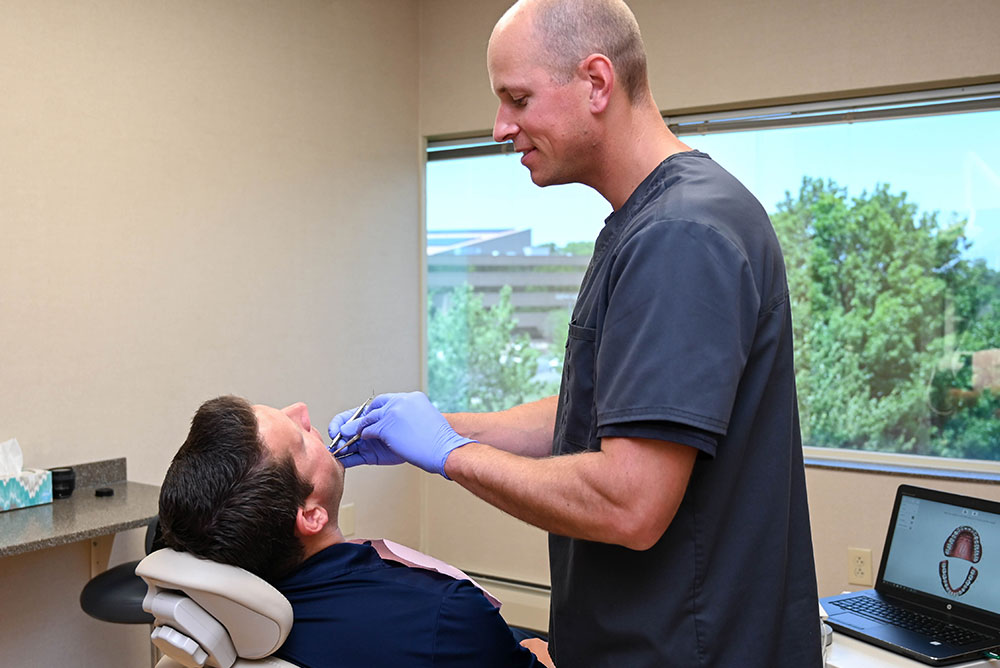Periodontal (gum) disease is a widespread condition, with half of all Americans affected.
When left untreated, it can lead to tooth loss and other potentially serious health conditions. Proper oral hygiene, including regular brushing and flossing, is often effective in treating mild forms of gum disease.

One of the first steps taken to treat periodontal disease is scaling and root planing (SRP), also referred to as a “deep cleaning” – a non-surgical method of deep cleaning the surfaces of the teeth below the gum line. This process can be effective at removing plaque and tartar (calcified plaque) the root and promoting healthy regeneration of the gum tissue. Successful SRP, when followed by practicing good oral hygiene, can stop the progression of mild periodontal disease.
How Does Gum Disease Develop?
Gum disease is caused by the buildup of bacteria known as plaque. This buildup can lead to inflamed gums, which may eventually pull away from the teeth to form deep pockets between the gums and teeth. Plaque can become trapped in these pockets where it cannot be removed by regular brushing.
As gum disease develops it is usually painless and shows no signs. As it develops, germs infect the gum tissues around the teeth, causing redness, swelling and bleeding.
You may need to be treated for gum disease if you notice any of the following signs:
- Your gums bleed during brushing and flossing
- Your gums appear red, discolored or swollen
- Your gums have started to recede (when the margin of gum tissue surrounding the teeth wears away or pulls back)
- You have started to develop chronic halitosis (bad breath)
The Why of Gum Grafting
While a gum graft can reduce further recession and bone loss, in some cases it can cover exposed roots to protect them from decay. As a result, this may reduce tooth sensitivity and improve the overall look of your smile. Whether to improve function or esthetics, our patients who are treated with gum grafting receive dual benefits: a beautiful new smile and improved periodontal health.
Treating Gum Disease = Overall Good Health
At Morgan & Lemke Periodontics & Dental Implants, we’re focused on restoring smiles and improving lives — and this starts with supporting good gum health. According to the American Dental Association, over 47% of the adult U.S. population over age 30 has severe gum disease (chronic periodontitis). If neglected for too long, gum disease can result in tooth loss. In addition, if these pockets become infected, it’s possible for the infection to spread throughout your jaw leading to potentially serious complications.
Did you know?
Gum disease has been linked to major health problems including heart disease, strokes, preterm and stillborn births, as well as certain cancers.
What to Expect
We will perform a thorough examination and consultation to determine if SRP is appropriate for you, including reviewing your health history and assessing the overall condition of your gums and the depths of your gum pockets. In some cases, if your gum disease is too severe, we may recommend other treatment options.
While similar to a regular professional dental cleaning, which focuses on removing plaque and tartar from the visible portion (crowns) of your teeth, SRP is performed at the roots. This two-step, deep cleaning procedure allows us to thoroughly clean the root surfaces of the teeth.
Did you know?
Scaling and root planing is the recommended way to remove bacteria-laden plaque from the surfaces and roots of teeth. Eliminating these bacteria is beneficial for your body’s immune system health.
SRP should cause very little discomfort. To be sure you are comfortable during the procedure, we will administer a local anesthetic to numb the gum area. An ultrasonic scaling tool is used to break up and remove plaque and tartar above and below the gum line. Next, we use a hand instrument to smooth the root surface to prevent the future buildup of plaque and help the gums reattach to the teeth. Antibiotics or other medications may be prescribed to prevent the possibility of infection, control any pain and promote healthy healing.
Deep cleaning with SRP is a more involved procedure than regular dental cleaning. While the procedure may take a single visit, multiple visits are often required to complete the treatment. After successful SRP, good oral hygiene at home is essential to prevent gum disease from recurring.
